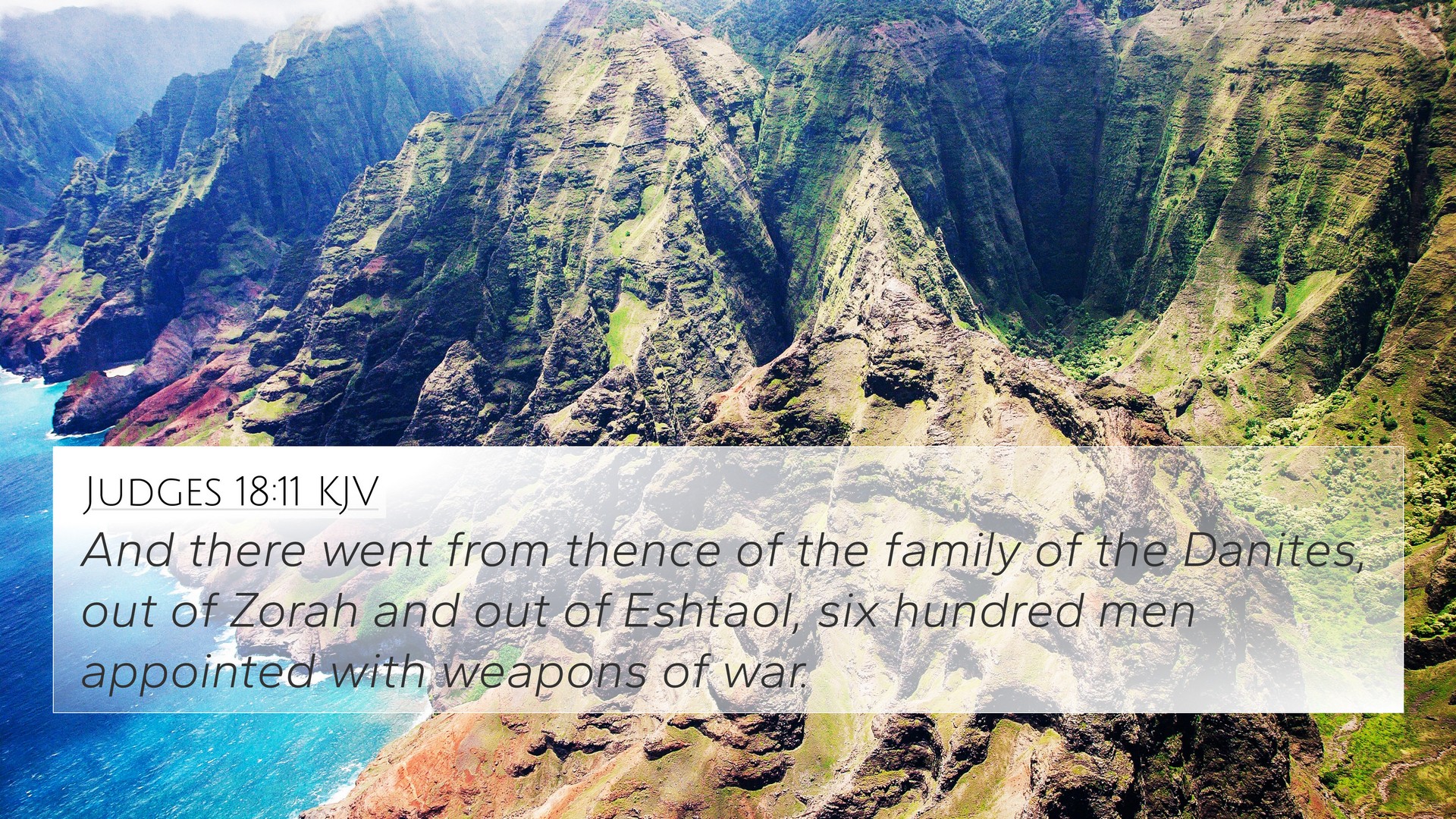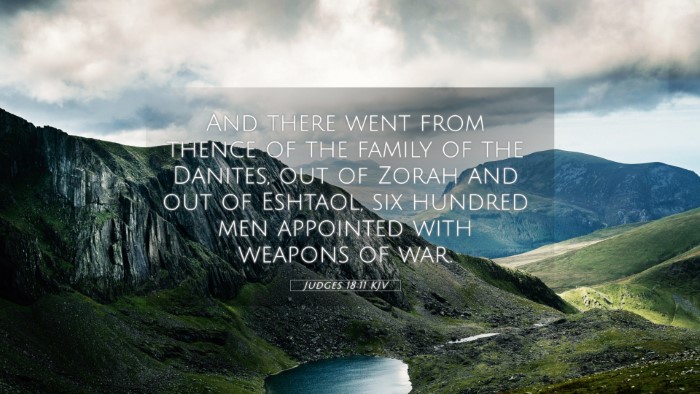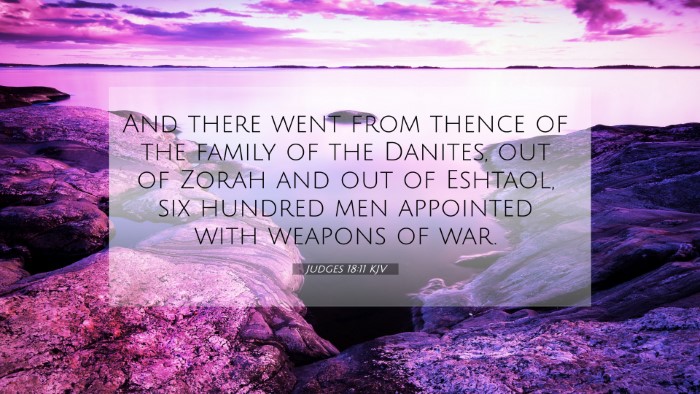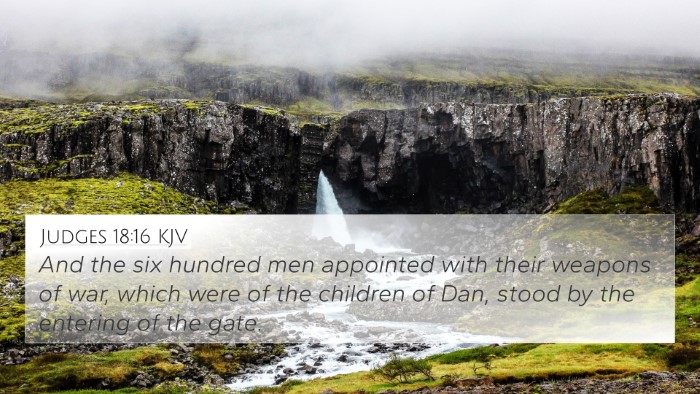Understanding Judges 18:11
Judges 18:11 states: "And there went from thence of the family of the Danites, out of Zorah and out of Eshtaol, six hundred men appointed with weapons of war."
This verse represents a significant moment in the narrative of the Book of Judges, highlighting the actions of the Danites as they moved to establish their territory. Below, we explore the insights derived from various public domain commentaries, including those by Matthew Henry, Albert Barnes, and Adam Clarke.
Summary of Commentary Insights
Matthew Henry's Commentary
Matthew Henry emphasizes the rebellious nature of the Danites and their quest for land. His interpretation reflects the notion that the Danites acted out of discontent and made an aggressive move to seek a more satisfactory territory.
- He notes the significance of the number of men—600—as it demonstrates a considerable force prepared for action.
- This migration is indicative of the broader theme of the Israelites' struggles during the Judges period, capturing their desire to possess what they believed was unattainable.
Albert Barnes' Notes
Albert Barnes provides a contextual analysis, highlighting that this migration of the Danites signifies their failure to occupy their allotted land in the Promised Land. This defection is part of a repeated pattern seen throughout the Book of Judges.
- Barnes emphasizes this act of the Danites is reflective of a misguided interpretation of God's promises and an over-reliance on military might to secure their future.
- He also draws parallels to other biblical narratives where tribes took matters into their own hands, leading to conflict.
Adam Clarke's Commentary
Adam Clarke offers a detailed historical perspective, focusing on the geographical movements of the Danites.
- Clarke elaborates on the locations mentioned—Zorah and Eshtaol—as significant centers, which framed the Danites' strategic movements against their enemies.
- He also suggests that their decision to move demonstrates a lack of faith in God's provision and guidance, opting instead for human-led endeavors.
Key Themes and Connections
This verse illustrates several overarching themes in the scripture, including:
- Rebellion and Discontent: The actions of the Danites show a wider trend of dissatisfaction among the tribes of Israel with their divinely assigned lands.
- Divine Promise vs. Human Action: There are interrogations of faith within the Israelite community when faced with challenges concerning land ownership.
- Military Strategy and Conflict: This narrative often emphasizes the dichotomy between trusting God and opting for military solutions, which is susceptible to human error.
Bible Verse Cross-References
Judges 18:11 connects with various other scriptures that enhance one's understanding of its meaning:
- Joshua 19:40-48 - The allotment of land to the tribe of Dan.
- Judges 1:34 - The failure of the Danites to conquer their allotted territory.
- 1 Samuel 14:16 - The armed men-related context during a military engagement.
- Hebrews 11:32-34 - A reflection on the faith exhibited by various judges.
- Deuteronomy 3:1-11 - The descriptions of territory battles and their implications.
- Romans 12:19 - The principle of leaving vengeance to God, contrary to the behavior of Danites.
- Judges 18:1 - The quest for broader contexts regarding the overall spiritual condition of Israel during judges' times.
Thematic Bible Verse Connections
In understanding Judges 18:11, it is crucial to explore thematic connections with other scriptures:
- Genesis 49:16-17 - The prophecy about Dan's character and future.
- Micah 5:2 - The future significance of the tribes.
- Psalms 78:68-70 - A reflection on God's choice of Israel and the tribes; contrast with human efforts.
Conclusion
The exploration of Judges 18:11 reveals a complex interaction of discontent, rebellion, and the quest for land within the Israelite tribes. Historical interpretations alongside scriptural cross-references illustrate a broader narrative that checks the alignment of faith with action amidst challenges.
By utilizing tools for Bible cross-referencing and exploring connections between Bible verses, one can gain deep insights into the intent of the biblical authors, their cultural context, and divine messages within the scriptures.



